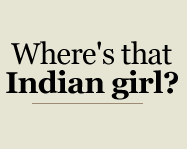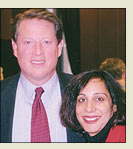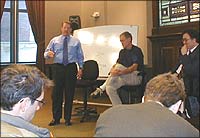The Rediff Special/Preeti Dawra


Where have you been the last couple of weeks?" asked the teaching assistant, Phillipe Reines, grabbing my shoulder. "He has been asking about the Indian girl ever since the first lecture. We have been searching all the departments for you." I stood there transfixed. "About me? Why?"
"Because," said Phillipe, "you are the one student he really connected with. You made quite an impression on the professor. He wants you back in his class at all costs."
By now, I was both slightly embarrassed and gleefully giddy. For the professor in question was none other than Albert Gore, Jr, the man who almost became leader of the Free World. Gore, who was a journalist during the Vietnam War, was teaching a class on 'The impact of media on politics and national affairs' at Columbia University in New York City this spring. To most people's surprise, he chose this as his first public role after the nail-biting presidential election. Needless to say, his was one of the most sought after classes at the university.
Phillipe, Gore's teaching assistant, shook me again in the middle of the journalism school building's main hall. "Pretty [which is what Preeti normally sounds like in the United States], why could we not find your name on the class list?" My mind starts racing: should I tell him the truth? Should I let him know I was not on the list [which was drawn by lottery], but had daringly sneaked past the Secret Service pretending to be part of the Gore entourage during the first lecture? [Makes me wonder whether these intimidating men are just plain stupid or I am just plain lucky!]
And if wriggling my way into the class was not enough, I engaged Gore in a conversation about India and the enormous impact that satellite television, particularly STAR TV, has had on the country. I found myself telling him about the exciting early Nineties. About how, along with the newly unshackling economy, even India's culture and mindset were being liberalised with the advent of BBC and MTV.
None of my observations -- now that I look back -- were profound. But Gore seemed to find our conversation stimulating. It resonated with his experience in the early Sixties, when he witnessed the impact of satellite television and the transformation it wrought in the United States. The first programme broadcast, he said, was the presidential speech, which changed forever how the medium would impact the public's perception of the president. Obviously, it was something he could really relate to.
I guess teachers generally appreciate students who help the class move along. That, probably, was what I did for Professor Gore. It could be why he tucked our discussion in his memory.
In the next class, Phillipe told me, Gore's guest was none other than Rupert Murdoch, the man who brought STAR TV to India. Gore had recounted my comments to Murdoch on the drive to the lecture and was keen for him to meet me. So, when he did not find me in class, he sent his team out to search for the missing Indian student!
During the class, he jousted with Murdoch about the role of corporate ownership and market forces in shaping the content and distribution of news today. He engaged Sandy Rowe, editor of The Oregonian, under whose leadership the paper was awarded the Pulitzer Prize in 1999 and again in 2001, in a discussion about how she went about establishing the standards of journalism at her paper.
As a classmate appropriately put it: "This class is like a membership to an elite club." Gore made it clear that the guest speakers were not there to entertain us, but to shed light on subjects on which they were authorities. We were given a formidable set of reading materials for every lecture and encouraged to ask the speakers questions on tough and controversial issues.
It made the classes even more exciting. We never knew what to expect in the next lecture and were always pleasantly surprised with who stopped by at class. After Murdoch, it was Alan Greenspan. The Federal Reserve chairman, who has a big say in the shaping of the American economy, was probed on his views about how the media reports on technical issues related to the economy.
Then there was David Letterman, a comedy show veteran who also hosts Late Night with David Letterman. [It appears in India on Zee English].
 The Letterman class, which demonstrated how politics and humour could mingle easily to entertain and inform, ended up in a game of role reversal -- imagine Vajpayee hosting Movers And Shakers [the show is obviously inspired from Letterman's] with Shekhar Suman as the guest in the hot seat. Gore and Letterman enacted a parallel to this seemingly absurd situation. The result: Gore was obviously not the last tree in the Redwood forest, nor was Letterman the main draw at the circus. Both of them can be serious and funny.
The Letterman class, which demonstrated how politics and humour could mingle easily to entertain and inform, ended up in a game of role reversal -- imagine Vajpayee hosting Movers And Shakers [the show is obviously inspired from Letterman's] with Shekhar Suman as the guest in the hot seat. Gore and Letterman enacted a parallel to this seemingly absurd situation. The result: Gore was obviously not the last tree in the Redwood forest, nor was Letterman the main draw at the circus. Both of them can be serious and funny.
The lecture also focused on the critical and growing role of humour in politics. Gore set the tone for the proceedings, saying, "I've been interviewed by Letterman twice and I've barely recovered from the experience." Letterman responded: "You know, while driving to the class, I told my writers I was kind of nervous as I had never done this before. They told me not to worry as Gore would do most of the talking!" With a beginning like that, the class was immediately at ease.
On a more serious note, Letterman revealed he was rarely able to host presidential candidates like Gore who knew something about the world and could give a legitimate opinion on a variety of issues. "Otherwise, you just end up talking about make-up to actresses." It actually made me wonder about the kind of job Jennifer Lopez's writers have on their hands before her next entrance at the Ed Sullivan Theatre.
Gore and Letterman also discussed the blurring of the line between news and entertainment, a trend that is perhaps manifesting itself in India as well. The ex-vice-president felt news was increasingly being combined with personality, attitude and entertainment. The result, he felt, was "derivative news" that occasionally took precedence over real news in the minds of the audience.
To illustrate this point, Gore pulled out a startling statistic: a significant number of young Americans -- approximately 15 per cent of the population -- get their news from comedy shows such as those hosted by Letterman. I wondered whether someone had done a similar survey in India. The results, I was sure, would be interesting.
While Letterman explained that humour made politics more accessible to youngsters, he disagreed that people watched his show for its news value. If they did, he added, they were getting a very distorted version. "We will do anything to get a laugh from the audience. What we do is take the news of the day and distort it, magnify it or simplify it."
Most students wanted to know how Gore responded to constant criticism from the press and humorists like Letterman. The former vice-president said that though he did not take note of them all the time, he did change his election strategy after the press criticised his performance in the first presidential debate.
For aspiring student journalists, Gore's class was an outstanding opportunity to look at the other side of the fence; to understand the effect the increasing role of the media has on politicians and their public lives. And who better to teach it than the one man who has been most scrutinized by the media in the past year?
When Gore concluded his unconventional gig as a part-time lecturer, the curtain fell on one of the most high-profile classes at the university, one that attracted more criticism than appreciation for the debutant professor. "I did not want to give you cheap headlines," Gore responded half-seriously in the last lecture, when a student repeatedly asked him why he would not comment on the elections throughout the semester. "I am not that kind of a guy."
But he succumbed to his students' relentless questioning and talked, in the final lecture, about his future plans. "Whether I am a presidential candidate or not again, I will re-enter the public arena at some point and work on issues close to me. The country was going through a very emotional time during the elections and I did not want to create more controversy by commenting on it. Also, I needed some time and distance to get a perspective on the elections."
The students also wanted to know why the classes were off-the-record. "When half the class is acting as students and the other half as paid stringers, it compromises the quality of the class," Gore commented. "I wasn't looking to have a press conference. I wanted to provide you all with a real classroom experience." And he did.
Page design: Dominic Xavier
The Rediff Specials